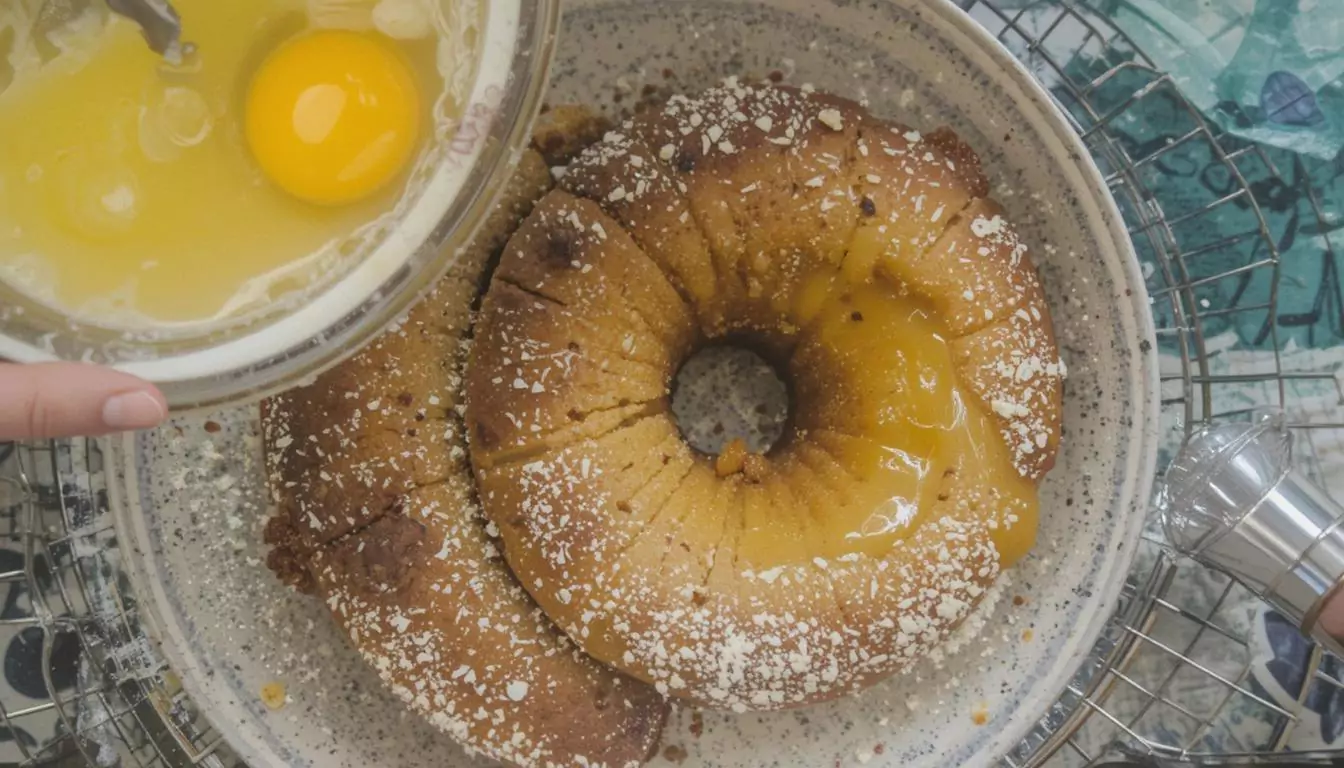Pound cake is a classic dessert loved for its dense texture, buttery richness, and indulgent flavor. But if you’ve ever considered tweaking your recipe, you might have wondered, what happens when you add an extra egg to a pound cake? Eggs are a critical ingredient in baking, affecting texture, structure, and flavor. Adding an extra egg is a small change that can bring significant results.
This article dives deep into the science of eggs in baking, explores the benefits and challenges of adding an extra egg to a pound cake, and provides practical tips for making adjustments. For more inspiration, check out Why Is My Chocolate Pound Cake Dry? and explore the Old-Fashioned Chocolate Pound Cake Recipe to test your skills.
The Role of Eggs in Baking
Eggs are not just a supporting ingredient; they are a cornerstone of baking. They influence the structure, texture, and flavor of a cake.
Why Are Eggs Essential?
- Structure: The proteins in egg whites set during baking, providing a stable structure that supports the cake.
- Richness: Yolks add fat, contributing to the cake’s creamy texture and rich flavor.
- Moisture and Emulsification: Eggs bind fats and liquids, ensuring a smooth batter and even distribution of ingredients.
Without enough eggs, cakes can lack cohesion and crumble easily. To understand more about how eggs function, visit Eggs in Baking: The Science Explained.
What Happens When You Add an Extra Egg?
Adding an extra egg to your pound cake recipe can transform its texture, moisture, and flavor. Here’s what to expect:
1. Enhanced Texture
- Softer Crumb: The fat and moisture from the additional yolk create a softer, more tender crumb.
- Improved Cohesion: The extra protein strengthens the cake, reducing crumbling and making it easier to slice.
2. Increased Moisture
- Eggs are natural moisturizers. Adding an extra egg helps retain moisture, keeping the cake fresher for longer.
- This is particularly beneficial for cakes that need to be stored for several days.
3. Richer Flavor
- The added yolk intensifies the cake’s buttery flavor, creating a creamier, more indulgent taste.
- It enhances the overall richness, perfect for an elevated dessert experience.
For an example of how slight tweaks can yield better results, try the 5-Star Chocolate Pound Cake Recipe.
When Should You Add an Extra Egg?
Adding an extra egg isn’t always necessary, but it can significantly enhance your cake under certain circumstances:
- High-Altitude Baking: An extra egg provides stability and structure, counteracting the challenges of baking at high altitudes.
- To Retain Moisture: If you’re baking a cake ahead of time, the extra egg helps it stay fresh longer.
- For a Softer Texture: If your recipe tends to produce a dense cake, adding an extra egg creates a lighter crumb.
Adjusting the Recipe When Adding an Extra Egg
Incorporating an extra egg requires careful adjustments to maintain the balance of the recipe.
1. Adjust Dry Ingredients
- Adding an extra egg increases the liquid content of the batter. To compensate, slightly reduce the amount of flour to maintain the desired texture.
2. Balance Fats and Sugars
- The additional yolk introduces more fat, so increasing the sugar or butter slightly can help balance the recipe.
3. Avoid Overmixing
- Overmixing introduces too much air into the batter, leading to a spongy texture. Mix the batter gently after adding the extra egg.
For inspiration on achieving the perfect balance of ingredients, explore the Chocolate Pound Cake Recipe with Oil, which uses oil to improve moisture.
Potential Downsides of Adding Too Many Eggs
While adding one extra egg can enhance your cake, overdoing it can lead to issues:
- Rubbery Texture: Too many egg whites add excess protein, making the cake firm or rubbery.
- Eggy Flavor: Overpowering egg flavors can overshadow the buttery sweetness of a pound cake.
- Heavy Batter: Excess liquid may weigh down the batter, affecting the cake’s rise and crumb.
Practical Tips for Baking with an Extra Egg
Adding an extra egg is a simple tweak, but following these tips will help ensure success:
- Test Small Batches: Experiment with smaller cakes or loaf pans to see how the change affects your recipe.
- Use Fresh, High-Quality Eggs: Fresh eggs provide better flavor and structure.
- Adjust Baking Time: Keep an eye on the oven—an extra egg may slightly increase baking time.
Frequently Asked Questions
1. How Does an Extra Egg Change the Flavor?
An extra yolk enhances richness and creaminess, creating a more luxurious flavor profile.
2. Can I Add an Extra Egg Without Adjusting Other Ingredients?
Yes, but slightly reducing flour or increasing butter and sugar can help maintain the balance of the batter.
3. What Happens If I Add Too Many Eggs?
Too many eggs can lead to a rubbery texture, dense crumb, or an overpowering eggy flavor.
4. Should I Use Whole Eggs or Just Yolks?
Whole eggs provide balance, while yolks alone enhance richness without affecting structure.
5. Does Adding Eggs Make the Cake Rise Higher?
Yes, eggs trap air during mixing, contributing to a lighter, more risen cake.
Conclusion
Adding an extra egg to a pound cake recipe can elevate its texture, moisture, and flavor, creating a more luxurious dessert. However, balance is key—adjust other ingredients to avoid pitfalls like rubbery textures or overpowering flavors. Whether you’re baking for a special occasion or experimenting with your recipe, understanding how eggs function in baking ensures success.
Ready to try it out? Start with the Old-Fashioned Chocolate Pound Cake Recipe or the festive Christmas Tree Cake Recipe for inspiration. Happy baking!

